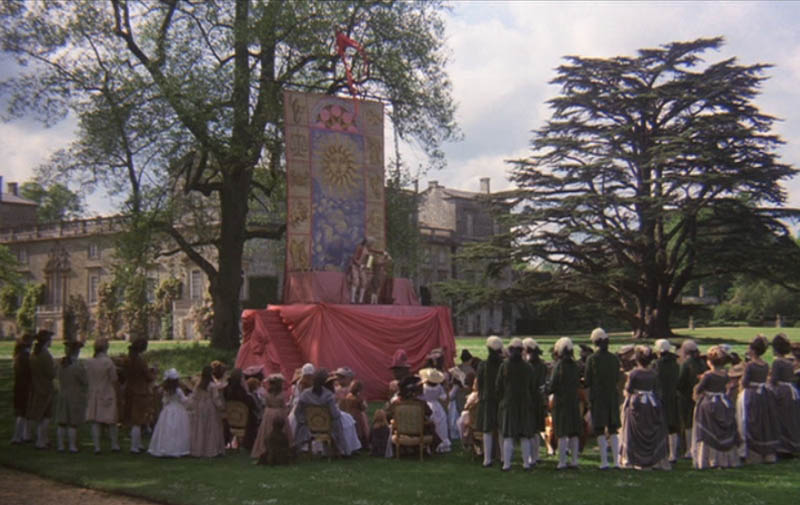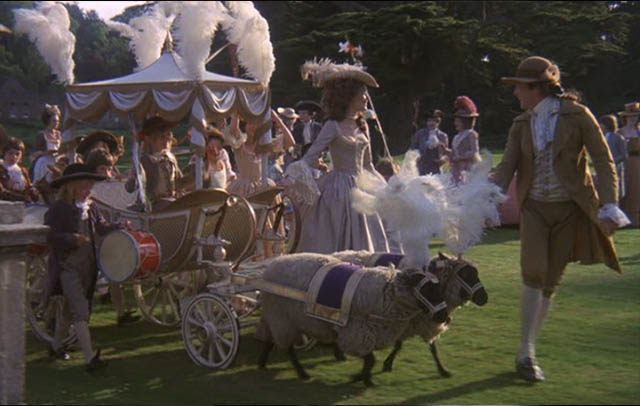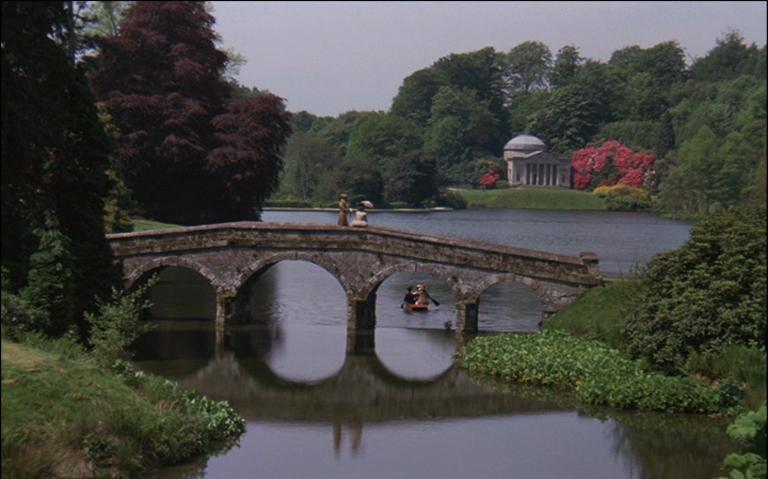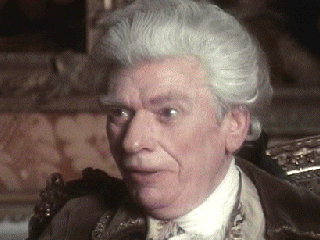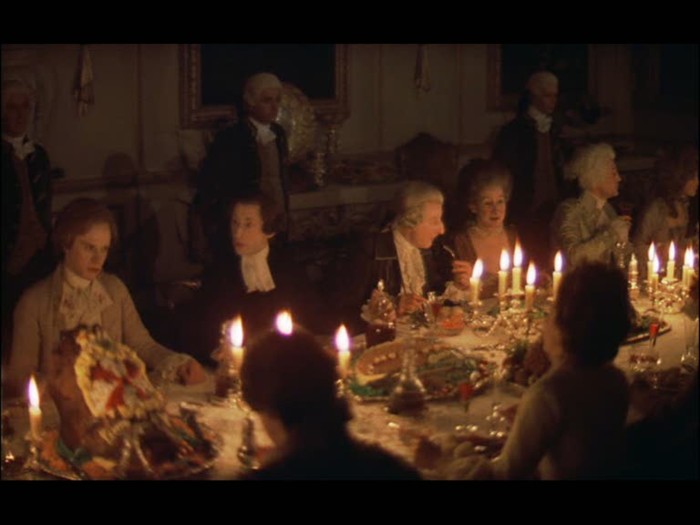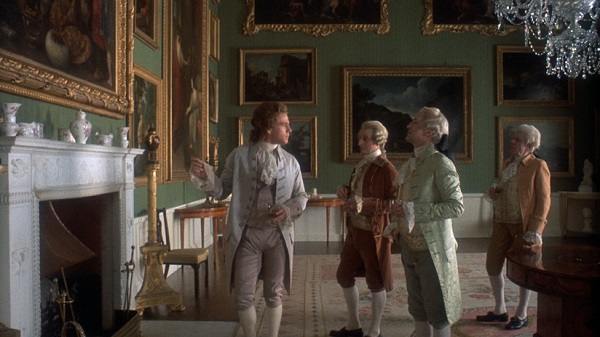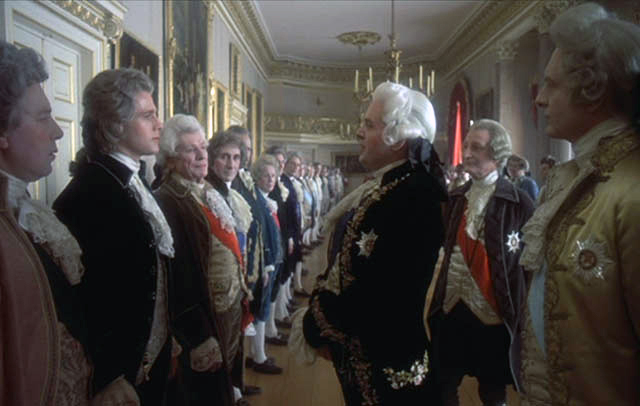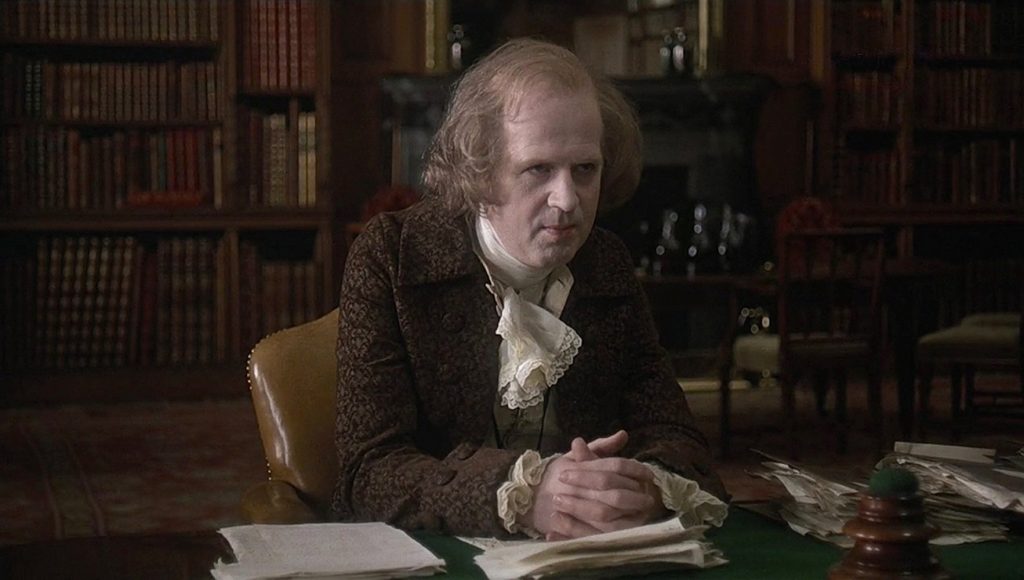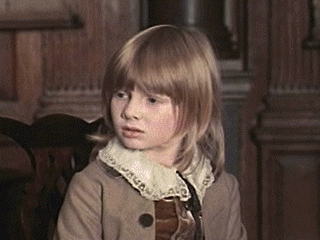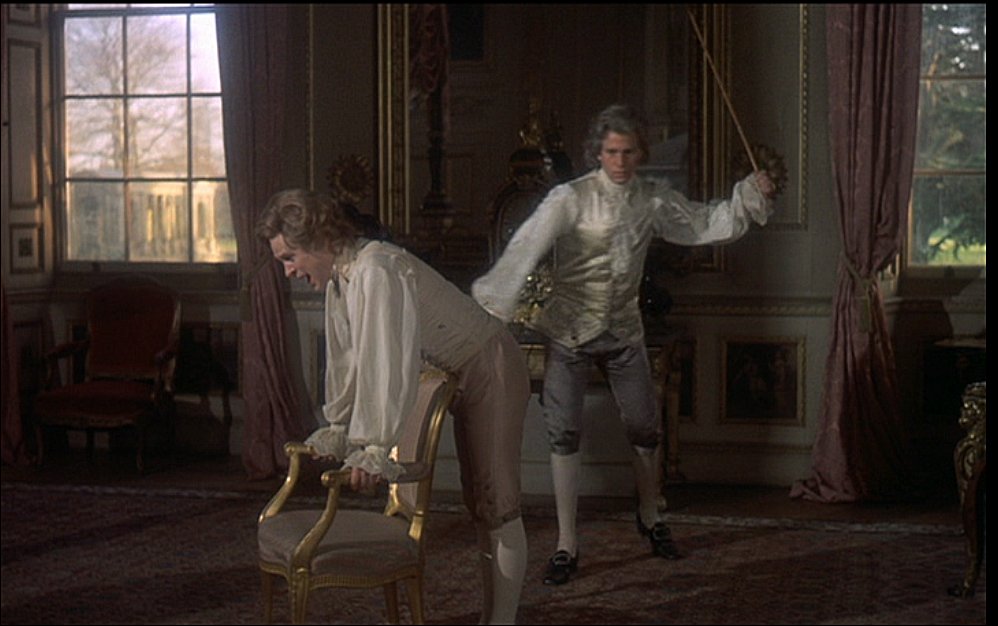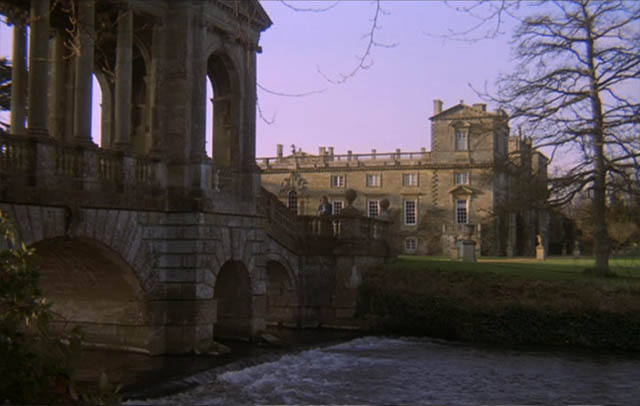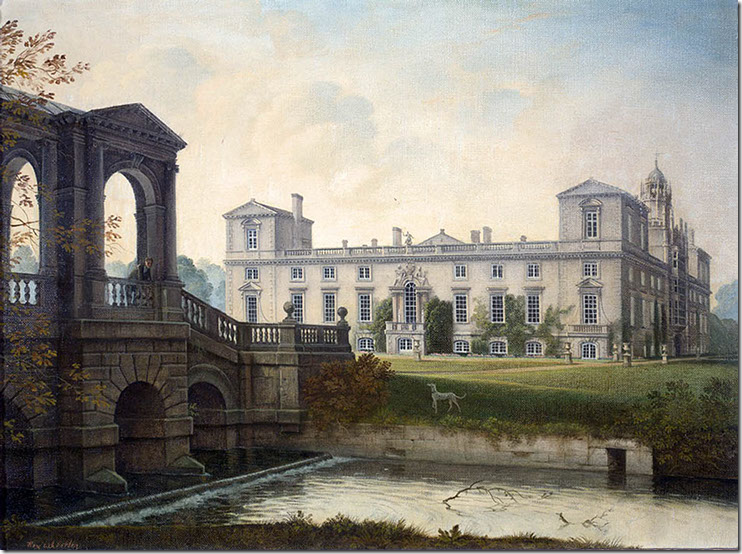Kubrick: Barry Lyndon part 8
Scene 75. As Act VIII of Barry Lyndon begins, we’re treated to a rare explicit time jump. Barry’s son Bryan is now 8 years old and is, it appears, a very happy little boy. Lord Bullingdon, meanwhile, has grown from an anxious little boy to an anxious young man, still sitting at his mother’s knee, still holding her hand, now wearing the white makeup and powdered wig of his station as a young lord.
The scene is Bryan’s eighth birthday party, and all of Lady Lyndon’s friends are there, as well as Barry’s mother. Barry, we could say, has arrived. He’s got access to wealth, he’s got wonderful social status, he’s got a beautiful wife whom he treats terribly, he’s got loads of friends and he’s having sex with every lady who meets his gaze.
Appropriately, the scene illustrating this is a magic show. A magician performs routine sleight-of-hand and conjuring tricks for Bryan as the crowd smiles and applauds, and we’re reminded that Barry’s life is a kind of magic trick of its own. Deception, trickery, showmanship and style got Barry where he is, and the deeper suggestion of the narrative is that everyone there at the party, indeed, everyone in the movie, has achieved their social status through some combination of thuggishness, trickery and deceit.
Scene 76. Bryan is trundled along in a carriage pulled by a pair of sheep. His mother is by his side. He is a very happy child. He’s the center of attention. This will be the pinnacle of Bryan’s happiness, the child as star. As a boy, he is, of course, interested in “things that go,” in this case a carriage. His interest in things that go will, of course, later get him killed. Perhaps that’s why the carriage is drawn by sheep instead of horses: Bryan is being led to the slaughter.
Scene 77. The small “Bryan is happy” sequence comes to an end with Barry and his mother tucking Bryan in for the night. Barry tells Bryan a war story. The story is notable for two things: it’s a pack of lies and it’s horrifically violent, full of bloodthirsty warfare and severed heads. So it’s both a deceit and illustrative of violence (which, Barry takes care to point out, was undertaken at the request of the king). Why does Barry tell this story to Bryan? To show he loves him. So all our themes meet again. Barry’s deceitful, violence-drenched journey up the social ladder has brought him, the long way around, back to love. Not the love of a schoolboy or the love of a passing soldier or the love of men at arms, but parental love. Barry clearly loves Bryan with all his heart, and when Bryan asks to have the candle remain lit at night, Barry indulges him. That indulgence will pay off, fatally, later.
Scene 78. As Lady Lyndon takes Bryan out for a boat ride with Lord Bullingdon and Reverend Runt, Barry and his mother watch from a bridge and discuss Barry’s future. We could say that the “Bryan is happy” sequence was an introduction to Act VIII, while the rubber meets the road here, as Barry’s mother introduces a new goal for Barry. It’s fine, she says, that he’s come so far in life, that he has access to all this wealth and all this beauty. She doesn’t seem to know or care about Barry’s deception and cruelty toward Lady Lyndon, but she knows that if he doesn’t get a title of his own, if anything happens to Lady Lyndon he’ll have nothing, and “darling Bryan” will be at the mercy of Lord Bullingdon.
It’s said that authors give characters in stories money so that the story can be about something other than how to pay the rent. That is, the poor can only think about how to get by, while the wealthy can think about love, or politics, or philosophy. And so we have romantic comedies about young people in New York who have incredible apartments while they work as a waitress or pursue a career in playwriting. Well here we have Barry, who has risen quite well indeed on nothing at all, nothing but his wits and his capacity to deceive, and has, for his trouble, regained his capacity to love. That might be the end of a happier story, but, of course, Kubrick has never been interested in happy stories.
While Barry has done quite well on his ability to act decisively, dispense violence and deceive the gullible, what Barry’s mother tells him in this scene, the little egg she lays in his brain, is that he won’t be truly happy until he’s no longer pretending to be a gentleman, but becomes the real thing, a real gentleman, with an income of his own, as a lord. That is to say, Barry’s mother exhorts him to go for all the marbles, to play the biggest con possible in his world, to buy and cheat his way to true respectability. And again, hidden inside her goading is the notion that all noblemen have gotten their titles and wealth through similar means.
Scene 79. In a sequence that traces Barry’s attempts to gain a title (our theme of social mobility), the first step for Barry is to become friends with someone who knows how to do that. So Barry gambles (gambling is seen, somehow, as a respectable way to both gain and lose fortunes) with one Lord Hallam, who becomes Barry’s life coach in the matter of how to obtain a title.
Scene 80. Lord Hallam introduces Barry to Lord Wendover, who is a kind of 18th-century influence peddler, and very aware of it, and very pleased with himself in that regard. He gives a long speech about how, once Barry is connected to him, no one will ever doubt his legitimacy. We’re never given a clear indication of what Wendover gets from this arrangement, but the narrator gives us some sort of idea of the scope of the task set before Barry — he has to purchase incredible clothes, purchase incredible paintings, purchase lands at incredible prices, and, presumably, Wendover is in for a cut of some of that along the way.
Scene 81. At a lawn party of some sort, Lord Wendover tells a funny story to Barry, Lady Lyndon and Lord Hallam. We take it that Barry is good at flattering Wendover, to the point where Wendover feels comfortable hanging out with the Lyndons and making small talk. That is, they almost appear as friends, which will become important later. The narrator interrupts the scene, however, and tells us, in advance, about how all of Barry’s plans will come to nothing.
Scene 82. We see one of the dinner parties Barry is required to give in order to gain his title. It’s a lavish affair, and the narrator informs us that this kind of event isn’t the limit of Barry’s expenses, that he is also required to bribe people very close to the king. Dishonesty, Kubrick reminds us, is endemic to the entire system of wealth and honor in this society.
Scene 83. Barry buys a painting, and we’re given a brief distillation on the art world of the 18th century, and our own. We’re told that one must have the “right” paintings in order to be considered a gentleman, but that vast sums of wealth are also capable of creating their own taste. Barry looks at an enormous 17th-century painting of “the adoration of the Magi,” and the most informed thing he can think of to say is “I love the use of the color blue by the artist,” with which the art dealer, smelling a hefty sale, readily agrees. In 20th century terms, Barry is a movie producer, financing art in exchange for prestige, and in the process believing himself to be an artist himself.
Scene 84. One of our themes is “social mobility,” and the climax of that story thread plays out here, as Lord Wendover introduces Barry to no less than King George III. We’re told that Barry has raised a troop of soldiers to send to America to fight in the Revolutionary War, and George cheerfully replies that that’s great and that Barry should raise another one, and then go and fight with them. It’s kind of an incredible scene, Barry reaching the pinnacle of his success by we’re told raising exactly the kind of army he joined back in Act II, using Lady Lyndon’s money to send men across the sea to fight in a war we know the crown will not win. That’s bitter irony enough, but then George doesn’t bat an eyelash, but instead cheerfully — cheerfully! — asks for twice as much, and suggests that Barry go and fight with them. George, we see, is very used to getting his own way, to the point where he doesn’t even need to bully or intimidate, he’ll gladly let men die by the thousands without a second thought. Barry’s definition of self is at stake, and George gives him a pat on the shoulder and suggests Barry die for him.
Scene 85. We are now given the first of what will be several “accountant” scenes, as the financial toll of Barry’s extravagant pursuits of his title come due. The accountant, played by Kubrick regular Philip Stone, is silent for this scene, as Lady Lyndon signs checks, Barry sulks, and the narrator tells us that Barry’s pursuit of his title is not only costing him (or, rather, Lady Lyndon) a ton of money, but is costing Barry years of his life. He no longer has fun, it appears, as he has his endless meetings with bankers and lawyers, caterers and tailors. It would seem at this point that Barry has made a bad trade: he was once a bon vivant, spending his nights gambling with socialites and bedding prostitutes and any other lady who turned his head, and now his pursuit of respectability has drained all the life from his life.
Scene 86. The “Barry’s climb” sequence over, we now get a scene establishing the relationship between Bryan and Lord Bullingdon. They’re at their studies, and Bryan won’t stop pestering Lord Bullingdon. (“What does ‘strenuous’ mean?” asks Bryan, as well he might.) Bullingdon, who’s trying to do his own work, eventually becomes impatient and spanks Bryan. But of course his anger is not with Bryan at all, but Bryan’s father Barry. Barry understands that all too well, and, as it happens, comes in as Bullingdon spanks Bryan. The “plot” of the scene between Bryan and Bullingdon is unimportant: they could be arguing about apples or boats, they could be fishing or walking through the park. The scene is there only to set up an ultimatum between Barry and Bullingdon.
Scene 87. Barry canes Lord Bullingdon for a second — and last — time. Bullingdon is pushed to his limit, and insists that he will one day kill Barry. Bullingdon’s problem, of course, is not so much that Barry replaced his father, but that he took away his mother, stole the love which he normally would have gotten from her, and is now looting his inheritance in order to finance his pursuit of a title. Which, again, raises the question: how did Sir Charles Lyndon, Bullingdon’s father, get his titles, lands, and air of respectability? Where, in the world of this narrative, does wealth ever come from, if not through violence and deceit?
Scene 88. Act VIII comes to a climax as Lady Lyndon gives a musical recital for assorted guests (including Lord Hallam and Lord Wendover) with Reverend Runt on flute and a small chamber group providing accompaniment. It’s the picture of refined upper-class entertainment, and Lord Bullingdon walks in with Bryan wearing his (that is, Bullingdon’s) shoes. Bryan clomps in, smiling — apparently Bullingdon told his brother that they were going to play a joke on mommy during her recital. Instead, he pulls the rug out from under not just the recital but Barry’s whole world, and, being quite the drama queen, gives a long speech to Lady Lyndon about his hatred of Barry and what he’s done to the Lyndon house. The speech goes on for so long, I’m moved to wonder why Barry — or Lady Lyndon, for that matter — or anyone — doesn’t try to end it sooner, defuse the situation.
What is Lady Lyndon thinking, as she sits at her instrument, aghast, as her son recites his vicious, poisonous, and entirely accurate assessment of his stepfather? Is she thinking “Oh God, he’s right?” Is she thinking “Oh God, he’s right, and I’ve looked foolish to so many people for so long, I can tell because no one in the room is leaping to my husband’s defense?”
And, for that matter, what is Barry thinking? Why doesn’t he see what’s coming and have a plan to deal with this situation? There must be ways to deal with a jealous stepson that will show the gathered gentry that he’s one of them in temperament. He sits there, seemingly helpless, as Bullingdon completely disassembles Barry’s carefully constructed persona, which not only doesn’t get him what he wants — his mother’s love — but in fact repulses her and exposes himself as a graceless, vicious loser. You would think that Barry could use those aspects of Bullingdon’s charges to turn the mood of the room.
But of course, Barry is, after all, not the gentleman he’s been pretending to be. He is, when his back is to the wall, an agent of violence, and the best answer he can think of, in the moment, to answer Bullingdon’s tirade, is to run up behind him and punch him in the kidney. All proverbial hell then breaks loose as the various lords and gentlemen at the recital attempt, ineffectually, to separate Barry from Bullingdon, until the recital hall begins to resemble nothing less than a rugby scrum.
Scene 89. Perhaps my favorite scene in the movie, it starts with a close shot of Barry resting on a railing, contemplating the station he finds himself in, and then zooms out and out to take in the surrounding estate until Barry is almost lost in the vastness. It’s the perfect example of the movie/painting dichotomy I talked about earlier, where the camera not only imitates the style of a specific kind of painting but a specific painting of the specific bridge of the real place the scene was shot. In this way, Kubrick literally injects his fictional character into real-world art history, and brings what we would normally consider a rather outmoded form of art vividly to life, suggesting — demanding — that we see the world of 18th century painting through the eyes of the people who posed for the artists of the time. Kubrick even seems to understand the importance of the scene, as it’s one of the few “zoom” shots that doesn’t include the narrator explaining what’s going on while we’re not looking.
Scene 90. Act VIII is effectively over, but Kubrick has two more scenes to act as nails in its coffin. In the first, Lord Wendover comes to a men’s club of some sort, alone, and sits down to eat lunch. Barry, eating alone, invites Wendover over (sorry) to join him, and Wendover declines. And then declines dinner later, and then declines ever seeing Barry again. Barry, who is now stuck in his role of “gentleman,” can’t tell Wendover what he thinks of him, and instead accepts Wendover’s brutal dismissal with polite courtesy. In a way, it’s the most violent scene in the movie, and a perfect bookend to the recital scene. When Barry’s place in the world was threatened he responded with a punch in the kidney; when Wendover’s place in the world is threatened, he responds with polite vagueness. The effect is just as devastating, and the only answer can be that Wendover has had his place all his life, that the murder and deceit that got him his title was all long in the past, that “to be a gentleman” is to master the art of destroying someone with a smile and apology.
Scene 91. In the second “accountant scene,” again Lady Lyndon writes checks, and again Barry sulks, but the stakes have changed. Just as Lord Wendover guaranteed Barry’s place with his word, he has now destroyed Barry’s place with a word, and all of Barry’s creditors have pounced, demanding payment from Barry’s sinking ship. In screenwriting terms, this is Barry’s “dark night of the soul,” where he’s further from his goal than ever, with no clear road to equilibrium.
